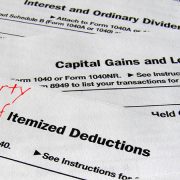The Importance Of Having The Right Financial Team For Your Cannabis Business
/0 Comments/in Marijuana Tax Planning & Marijuana Tax Defense/by Tax Attorney2018 Holiday Party Write-Offs After Tax Reform
/0 Comments/in Tax Deductible, Year-end tax planning/by Tax AttorneyAre You Effected By Hurricane Florence? IRS Is Providing You With Tax Relief And Extending Upcoming Tax Deadlines.
/0 Comments/in IRS Operations & Procedures/by Tax AttorneyConnecticut Crypto Currency Trader Convicted For Wire Fraud And Sentenced To 21 Months In Prison And Pay Restitution Of Over $9 Million.
/0 Comments/in Crypto-currency / Bitcoin, IRS Criminal Investigation Division Operation & Developments – Domestic Tax Issues/by Tax AttorneyOVDP Ending September 28, 2018
/0 Comments/in Foreign Accounts – IRS Operations & Investigation Developments, IRS Operations & Procedures, Offshore Voluntary Disclosure Program (OVDP), Undisclosed Foreign Bank Accounts & Unreported Foreign Income/by Tax AttorneyIf you have undisclosed foreign bank accounts and/or unreported foreign income and you are considering to enter into the Offshore Voluntary Disclosure Program (OVDP), beware that time is running out. The IRS announced in March 2018 that it is officially closing this program September 28, 2018.
Since OVDP’s initial launch in 2009, more than 56,000 taxpayers have used the various terms of the program to comply voluntarily with U.S. tax laws. These taxpayers with undisclosed offshore accounts have paid a total of $11.1 billion in back taxes, interest and penalties. The number of taxpayer disclosures under the OVDP peaked in 2011, when about 18,000 people came forward. The number steadily declined through the years, falling to only 600 disclosures in 2017. The planned end of the current OVDP also reflects advances in third-party reporting and increased awareness of U.S. taxpayers of their offshore tax and reporting obligations.
Since the announcement, the IRS has not received any public comments addressing a continued need for the OVDP. The IRS stated that it will still maintain a pathway for taxpayers who may have committed criminal acts to voluntarily disclose their past actions and come into compliance with the tax system. The IRS has yet to issue updated procedures on this.
Separately, the IRS continues to combat offshore tax avoidance and evasion using whistleblower leads, civil examination and criminal prosecution. The implementation of the Foreign Account Tax Compliance Act (FATCA) and the ongoing efforts of the IRS and the Department of Justice to ensure compliance by those with U.S. tax obligations have enhanced the IRS’ ability to identity and charge non-compliant taxpayers undisclosed foreign financial assets. Since 2009, 1,545 taxpayers have been indicted related to international activities through the work of IRS Criminal Investigation.
Penalties for Non-Compliance.
Federal tax law requires U.S. taxpayers to pay taxes on all income earned worldwide. U.S. taxpayers must also report foreign financial accounts if the total value of the accounts exceeds $10,000 at any time during the calendar year. Willful failure to report a foreign account can result in a fine of up to 50% of the amount in the account at the time of the violation and may even result in the IRS filing criminal charges.
Civil Fraud – If your failure to file is due to fraud, the penalty is 15% for each month or part of a month that your return is late, up to a maximum of 75%.
Criminal Fraud – Any person who willfully attempts in any manner to evade or defeat any tax under the Internal Revenue Code or the payment thereof is, in addition to other penalties provided by law, guilty of a felony and, upon conviction thereof, can be fined not more than $100,000 ($500,000 in the case of a corporation), or imprisoned not more than five years, or both, together with the costs of prosecution (Code Sec. 7201).
The term “willfully” has been interpreted to require a specific intent to violate the law (U.S. v. Pomponio, 429 U.S. 10 (1976)). The term “willfulness” is defined as the voluntary, intentional violation of a known legal duty (Cheek v. U.S., 498 U.S. 192 (1991)).
Additionally, the penalties for FBAR noncompliance are stiffer than the civil tax penalties ordinarily imposed for delinquent taxes. For non-willful violations, it is $10,000.00 per account per year going back as far as six years. For willful violations, the penalties for noncompliance which the government may impose include a fine of not more than $500,000 and imprisonment of not more than five years, for failure to file a report, supply information, and for filing a false or fraudulent report.
Lastly, failing to file Form 8938 when required could result in a $10,000 penalty, with an additional penalty up to $50,000 for continued failure to file after IRS notification. A 40% penalty on any understatement of tax attributable to non-disclosed assets can also be imposed.
Voluntary Disclosure
A separate program, the Streamlined Filing Compliance Procedures, for taxpayers who may have been unaware of their filing obligations, has helped about 65,000 additional taxpayers come into compliance. These streamlined procedures will continue to be available for now, but as with OVDP, the IRS has said it may end this program too at some point.
For taxpayers who were non-willful, we recommend going into the Streamlined Filing Compliance Procedures of OVDP. Under these procedures the penalty rate is 5% and if you are a foreign person, that penalty can be waived. This is a very popular program and we have had much success qualifying taxpayers and demonstrating to the IRS that their non-compliance was not willful.
What Should You Do?
We encourage taxpayers who are concerned about their undisclosed offshore accounts to come in voluntarily before learning that the U.S. is investigating the bank or banks where they hold accounts. By then, it will be too late to avoid the new higher penalties under the OVDP of 50% percent – nearly double the regular maximum rate of 27.5% and 10 times more than the 5% rate offered in the expanded streamlined procedures.
Don’t let another deadline slip by. The IRS will not be keeping these special voluntary disclosure programs open indefinitely and once the IRS contacts you, you cannot get into any of these programs and would be subject to the maximum penalties (civil and criminal) under the tax law. Protect yourself from excessive fines and possible jail time. Let the tax attorneys of the Law Offices Of Jeffrey B. Kahn, P.C. located in Orange County (Irvine), San Francisco Bay Area (including San Jose and Walnut Creek) and elsewhere in California help ensure that you are in compliance with federal tax laws.
Did You Receive IRS Notice LT16? What You Need To Do To Prevent An IRS Levy
/in IRS Operations & Procedures, Levies, Tax Audits & Appeals, Tax Collection Actions/by Tax AttorneyCould The Trump Administration Be Conducting A Secret War Against Cannabis?
/0 Comments/in Marijuana Tax Planning & Marijuana Tax Defense/by Tax AttorneySan Diego Crypto Currency Trader Indicted And Held Without Bond In The U.S. For Money Laundering
/0 Comments/in Criminal Tax Enforcement, Criminal Tax Litigation – Domestic Tax Issues, Crypto-currency / Bitcoin, IRS Criminal Investigation Division Operation & Developments – Domestic Tax Issues/by Tax AttorneyDo not think that just because digital exchanges are not broker-regulated by the IRS and digital exchanges are not obligated to issue a 1099 form reporting transactions, that your crypto currency transactions will always be a secret. The Federal government is cracking down on non-compliant traders.
Charges Filed Following Investigation By Federal Authorities
The U.S. Attorney’s Office for the Southern District Of California (which serves San Diego) announced on August 17, 2018 in a press release that a bitcoin dealer, Jacob Burrell a/k/a Jacob Burrell Campos, was indicted for international money laundering and is being held without bond. Mr. Burrell was arrested on August 13, 2018 as he tried to enter the United States from Mexico at the Otay Mesa Port of Entry.
According to statements made in court by Assistant U.S. Attorney Robert Ciaffa in the August 17th bond hearing, Mr. Burrell was a prolific Bitcoin dealer who sold approximately $750,000 worth of Bitcoin to hundreds of buyers throughout the United States. He conducted 971 separate transactions with over 900 individual customers, and accepted cash in person, through his bank accounts, and through MoneyGram. AUSA Ciaffa told the court that Mr. Burrell operated as a Bitcoin “exchanger” and his activities constituted a “money transmitting business”. As such, he was required to register with the Department of Treasury, and comply with all anti-money laundering requirements, including reporting suspicious cash transactions. In this case, Mr. Burrell accepted cash “with no questions asked” and in return for a 5% fee, supplied hundreds of individuals with an easy outlet to avoid the anti-money laundering laws applicable to all financial institutions, including licensed and registered Bitcoin exchanges. According to AUSA Ciaffa, Mr. Burrell’s activities “blew a giant hole” through the legal framework of U.S. anti-money laundering laws by soliciting and introducing into the U.S. banking system close to $1 million in unregulated cash.
18 U.S.C. §1956 – Laundering Of Monetary Instruments
18 U.S.C. § 1956(a) defines three types of criminal conduct: domestic money laundering transactions (§ 1956(a)(1)); international money laundering transactions (§ 1956(a)(2)); and undercover “sting” money laundering transactions (§ 1956(a)(3)). Crypto currency traders and marijuana-related businesses need to be aware of domestic money laundering transactions (§ 1956(a)(1)).
To be criminally culpable under 18 U.S.C. § 1956(a)(1), a defendant must conduct or attempt to conduct a financial transaction, knowing that the property involved in the financial transaction represents the proceeds of some unlawful activity, and the property must in fact be derived from a specified unlawful activity.
Violations of § 1956 have a maximum potential 20-year prison sentence and a $500,000 fine or twice the amount involved in the transaction, whichever is greater. There is also a civil penalty provision in § 1956(b) which may be pursued as a civil cause of action. Under this provision, persons who engage in violations of any of the subsections of 1956(a) are liable to the United States for a civil penalty of not more than the greater of $10,000 or the value of the funds involved in the transaction.
Mr. Burrell is being charged with 28 counts of money laundering. Each conviction for money laundering carries a maximum penalty of 20 years in prison and/or a $500,000 fine or twice the amount involved in the transaction, whichever is greater.
Other charges and possible punishment in the indictment include:
- Conducting an unlicensed money transmitting business, in violation of 18 USC 1960. Statutory maximum: Five years in prison, $250,000 fine.
- Failing to maintain an anti-money laundering program, in violation of 18 USC 5318(h), 5322(b). Statutory maximum: Ten years in prison, $500,000 fine.
- Conspiracy to structure international instrument transactions, in violation of 18 USC 371 and 31 USC 5324(c)(3). Statutory maximum: Five years in prison, $250,000 fine.
Indictment Culminated Investigation By Multiple Federal Agencies
The Department Of Homeland Security (Homeland Security Investigation Unit), Postal Inspection Service and the Internal Revenue Service investigated this case.
U.S. Magistrate Judge Karen S. Crawford found that Mr. Burrell had significant ties to Mexico, citizenship in three countries, no steady employment in the United States, the ability to access large sums of cash, and a disdain and unwillingness to comply with U.S. laws. She concluded at the August 17th bond hearing that Mr. Burrell posed a substantial risk of flight, and ordered him held without bail.
Keep in mind that the charges and allegations by U.S. Attorneys’ Office are merely accusations and the defendant is considered innocent unless and until proven guilty. However, regardless of the outcome of this indictment you can bet that Mr. Burrell will likely have to face the Civil Division of the Internal Revenue Service.
What Should You Do?
The IRS is always interested in teaming up with other Federal agencies in their investigations of non-compliance with the laws and with only several hundred people reporting their crypto gains each year, the IRS suspects that many crypto users have been evading taxes by not reporting crypto transactions on their tax returns. Don’t delay because once the IRS has targeted you for investigation – even if it is a routine random audit – it will be too late voluntarily come forward. Let the tax attorneys at the Law Offices Of Jeffrey B. Kahn, P.C. located in Orange County (Irvine), San Francisco Bay Area (including San Jose and Walnut Creek) and offices elsewhere in California get you set up with a plan that may include being qualified into a voluntary disclosure program to avoid criminal prosecution, seek abatement of penalties, and minimize your tax liability.
Got IRS Debt? Know When It’s Really The IRS Contacting You.
/0 Comments/in IRS Operations & Procedures/by Tax AttorneyFrom time to time the IRS issues consumer warnings on the fraudulent use of the IRS name or logo by scammers trying to gain access to taxpayers’ financial information in order to steal their identity and assets so everyone should know how the IRS contacts taxpayers.
Suspicious e-Mail/Phishing
When identity theft takes place over the Internet, it is called phishing. Phishing (as in “fishing for information” and “hooking” victims) is a scam where Internet fraudsters send e-mail messages to trick unsuspecting victims into revealing personal and financial information that can be used to steal the victims’ identity. Current scams include phony e-mails which claim to come from the IRS and which lure the victims into the scam by telling them that they are due a tax refund.
Key Facts About How The IRS Communicates With Taxpayers:
- The IRS does not normally initiate contact with taxpayers by email.
- The IRS does not send text messages or contact people through social media.
- When the IRS needs to contact a taxpayer, the first contact is normally by letter delivered by the U.S. Postal Service. Fraudsters will send fake documents through the mail, and in some cases will claim they already notified a taxpayer by U.S. mail.
- Depending on the situation, IRS employees may first call or visit with a taxpayer. In most instances, the IRS sends a letter or written notice to a taxpayer in advance.
- IRS revenue agents or tax compliance officers may call a taxpayer or tax professional after mailing a notice to confirm an appointment or to discuss items for a scheduled audit.
- IRS has contracted with selected private debt collectors who can call taxpayers for the collection of certain outstanding inactive tax liabilities, but only after the taxpayer and their representative have received written notice.
- IRS revenue officers and agents routinely make unannounced visits to a taxpayer’s home or place of business to discuss taxes owed, delinquent tax returns or a business falling behind on payroll tax deposits. IRS revenue officers will request payment of taxes owed by the taxpayer. However, taxpayers should remember that payment will never be requested to a source other than the U.S. Treasury.
- When visited by someone from the IRS, taxpayers should always ask for credentials. IRS representatives can always provide two forms of official credentials: a pocket commission and an IRS Personal Identity Verification Credential.
Contacting IRS To Report Fraudulent Scams
Taxpayers who receive the IRS phone scam or any IRS impersonation scam should report it to the Treasury Inspector General for Tax Administration at its IRS Impersonation Scam Reporting site and to the IRS by emailing phishing@irs.gov with the subject line “IRS Impersonation Scam.”
What You Should Do If You Really Do Have Tax Issues?
The tax attorneys of the Law Offices Of Jeffrey B. Kahn, P.C. located in Orange County (Irvine), San Francisco Bay Area (including San Jose and Walnut Creek) and elsewhere in California know exactly what to say and how to handle issues with the IRS as well as State Tax Agencies. Our experience and expertise not only levels the playing field but also puts you in the driver’s seat as we take full control of resolving your tax problems.
Keep In Touch
MEET US IN PERSON
Services
- Abatement of Tax Penalties
- Audits And Tax Court
- Business Transactions
- Cannabis / Marijuana Tax Services
- Criminal Tax Investigations
- Crypto-currency / Bitcoin – Tax Representation Services
- Currently Not Collectible
- Delinquent Tax Returns
- Employment And Payroll Taxes
- Entity Formations
- Estate Planning
- Estate Planning For Non US Citizens
- Estate Tax Planning
- FATCA | Foreign Account Reporting Compliance
- FBAR | Foreign Bank Account Reporting
- Full Pay Service
- Income Tax Planning
- Innocent Spouse Claims
- IRS & State Tax Controversies
- IRS Offshore Tax Investigations
- IRS Offshore Tax Investigations
- IRS State Tax Controversies
- Offers In Compromise
- Payment Agreements
- Representation Of Tax Preparers And Other Tax Professionals
- Revenue Officer Assistance
- Tax & Estate Plannng
- Tax Liens And Levies
- Wage Garnishment











 Follow
Follow Follow
Follow